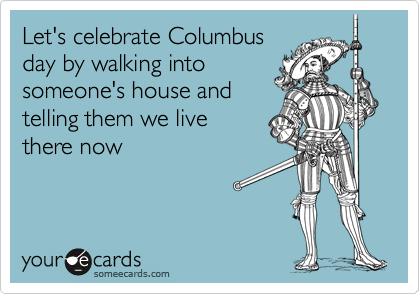Today’s Friday funny is Columbus. Here’s a link to a high school project that proclaims “Columbus is our hero” at its end.
 But Columbus is funny for another reason. He’s famous for being wrong – and wrong on so many levels, and that’s one of the aspects I like to teach about US history. Sometimes historical causation comes from people being flat wrong. First, Columbus never made it to his desired location on the East Indies. His hope and belief that he had reached Japan turned out to be way wrong. Second, he was even willing to try his wild idea of going west to get to the east because he was wrong about the size of the globe. Columbus thought the Earth was 16,000 miles in circumference. In actuality, it’s about 25,000. Third, and here’s where we get a little religion from an older but terrific essay by Pauline Moffitt Watts, Columbus was wrong that his voyage was destined to help bring the biblical “end times.” He wrote in 1500, “God made me the messenger of the new heaven and the new earth of which he spoke in the Apocalypse of St. John after having spoken of it through the mouth of Isaiah; and he showed me the spot where to find it.” A form of apocalypse came with Columbus – in the form of microbes that destroyed the bodies and communities of native peoples – but last I checked, Jesus hasn’t shown up yet.
But Columbus is funny for another reason. He’s famous for being wrong – and wrong on so many levels, and that’s one of the aspects I like to teach about US history. Sometimes historical causation comes from people being flat wrong. First, Columbus never made it to his desired location on the East Indies. His hope and belief that he had reached Japan turned out to be way wrong. Second, he was even willing to try his wild idea of going west to get to the east because he was wrong about the size of the globe. Columbus thought the Earth was 16,000 miles in circumference. In actuality, it’s about 25,000. Third, and here’s where we get a little religion from an older but terrific essay by Pauline Moffitt Watts, Columbus was wrong that his voyage was destined to help bring the biblical “end times.” He wrote in 1500, “God made me the messenger of the new heaven and the new earth of which he spoke in the Apocalypse of St. John after having spoken of it through the mouth of Isaiah; and he showed me the spot where to find it.” A form of apocalypse came with Columbus – in the form of microbes that destroyed the bodies and communities of native peoples – but last I checked, Jesus hasn’t shown up yet.What’s the point about all this “wrong”? Perhaps the take home message is this: history can be clumsy; misinformation can be meaningful, very meaningful; legends can make us laugh, but they can also have lasting effects. When I teach the Age of Encounter, one of the main points is the messiness of history.
So … do you have any other examples of wrongs making big change in history? If so, I’d love to hear them.
Other main points (and this is where students interested in a good grade on Wednesday’s quiz will really pay attention – wink, wink) are the various theories about how humans first made it to North and South America, the types of crops that allowed for sedentary communities to emerge, what factors led western Europeans to explore in the first place, and where in Africa did those who were enslaved come from.
Hopefully my students won’t have as many wrong answers as Columbus. But then again, if they do, maybe they’ll become as famous and infamous as that old intrepid sailor.


